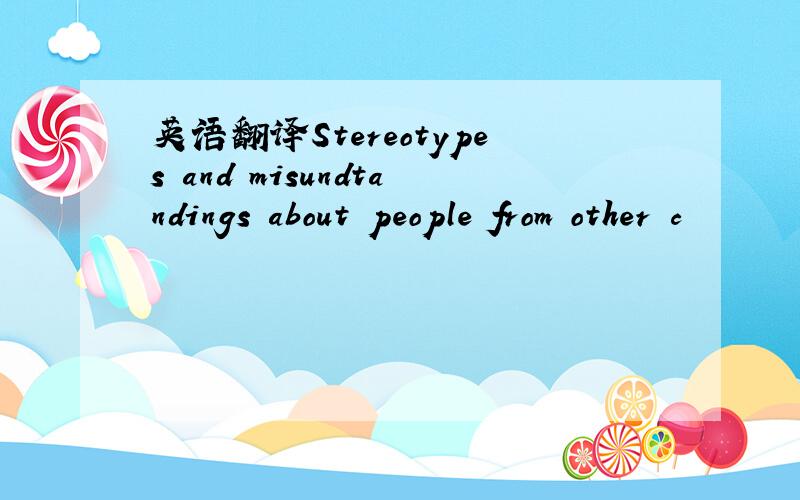英语翻译Stereotypes and misundtandings about people from other c
来源:学生作业帮 编辑:神马作文网作业帮 分类:英语作业 时间:2024/11/20 23:36:31
英语翻译
Stereotypes and misundtandings about people from other cultures sometimes seem to be unavoidable .Even within a single country like Japan,there are typical stereotypical images of Tokyo people as opposed to Osaka people,and East Japan inhabitants versus those in Western Japan .Such stereotypes often lead to unusual and sometimes amusing situations.When I arrived in Australia to study at the University of Canberra,I was assigned to a room in student ressidence on campus,where I met people of many different nationalites.One day ,when the residents were still new to each other during the second week of the frist semester,I met one of the other post-graduate students.He was from Ghana and his name was Kofi,which means “Friday”because he was born on a Friday.He explained to me that this is a common way to name children in Ghana.Kofi was a PhD research student,but we lived in the same block of units,so I had seen him a few times.Suddenly he said,“Mayumi,will you teach me to use a computer in the computer centre?”Confused by the sudden request,I replied,“Why are you asking me,Kofi?I don’t know how to use a computer.I’ve never used one in my life.”Kofi looked at me with a puzzled expression on his face and said,“But you are from Japan.” Although the residents of my block were all very aware that on of our Australian roommates was a student who was pursuing a computer major and who seemed to know absolutely everything about computers,of course,Kofi had to ask me because I was from a country whose image was that of a highly technological society and a leading exporter of computers.By they way ,I now know how to use computers.I learned it in Australia!After I completed an MA(TESOL)degree,I worked as a reasearch assistant/part time teacher at Hanoi University in Vietnam.The students’English there is rather different from that in the USA or Great Britain,which reflects the particular Vietnamese values.
Stereotypes and misundtandings about people from other cultures sometimes seem to be unavoidable .Even within a single country like Japan,there are typical stereotypical images of Tokyo people as opposed to Osaka people,and East Japan inhabitants versus those in Western Japan .Such stereotypes often lead to unusual and sometimes amusing situations.When I arrived in Australia to study at the University of Canberra,I was assigned to a room in student ressidence on campus,where I met people of many different nationalites.One day ,when the residents were still new to each other during the second week of the frist semester,I met one of the other post-graduate students.He was from Ghana and his name was Kofi,which means “Friday”because he was born on a Friday.He explained to me that this is a common way to name children in Ghana.Kofi was a PhD research student,but we lived in the same block of units,so I had seen him a few times.Suddenly he said,“Mayumi,will you teach me to use a computer in the computer centre?”Confused by the sudden request,I replied,“Why are you asking me,Kofi?I don’t know how to use a computer.I’ve never used one in my life.”Kofi looked at me with a puzzled expression on his face and said,“But you are from Japan.” Although the residents of my block were all very aware that on of our Australian roommates was a student who was pursuing a computer major and who seemed to know absolutely everything about computers,of course,Kofi had to ask me because I was from a country whose image was that of a highly technological society and a leading exporter of computers.By they way ,I now know how to use computers.I learned it in Australia!After I completed an MA(TESOL)degree,I worked as a reasearch assistant/part time teacher at Hanoi University in Vietnam.The students’English there is rather different from that in the USA or Great Britain,which reflects the particular Vietnamese values.

对异国文化来客的误解与思维定式看似无可避免.即使在像日本这样的单一(民族)国家中,仍存在如“大阪人与东京人是相对的”这种惯性印象,同时,东日本居民也与西部居民相对.这种惯性思维常导致不常见又有些可笑的情形.
当我为去堪培拉大学上学而抵达澳大利亚时,我被分配到了校园中的一件学生宿舍.在那儿我遇到了许多不同国籍的人.有一天,当大家在第一学期第二周仍对彼此有些生疏时,我碰到了一位研究生.他是加纳(非洲一国)人,名叫科菲——即”星期五”之意,因为他是在周五出生的.他对我解释说这在加纳是一种很普遍的为孩子起名的方式.科菲是一位博士研究生,但是我们住在同一栋单元楼,所以我也曾见过他几次.突然,他说:“真由美,你能教我在电脑中心用电脑吗?”我被这个突然的请求弄晕了,于是我回答道:“科菲,你为什么要拜托我呢?我也不会用电脑啊,我这辈子还没用过电脑呢!”科菲一脸迷惑地看着我,说道:“但是你是日本来的啊.”尽管这栋楼的同学们都知道我们有一位从事电脑课程,而且基本上通晓电脑一切的澳大利亚室友.当然,科菲一定要问我则是因为我从一个给人以“高科技社会与电脑出口国”印象的国家而来.
另外稍提一句,我现在已经学会用电脑了,在澳大利亚学会的.在我完成了硕士学位后,我在越南的河内大学当了一位研究助理兼兼职老师.那儿学生的英语也和美国或英国的英语有所不同,这折射出了典型的越南人民的价值观.
当我为去堪培拉大学上学而抵达澳大利亚时,我被分配到了校园中的一件学生宿舍.在那儿我遇到了许多不同国籍的人.有一天,当大家在第一学期第二周仍对彼此有些生疏时,我碰到了一位研究生.他是加纳(非洲一国)人,名叫科菲——即”星期五”之意,因为他是在周五出生的.他对我解释说这在加纳是一种很普遍的为孩子起名的方式.科菲是一位博士研究生,但是我们住在同一栋单元楼,所以我也曾见过他几次.突然,他说:“真由美,你能教我在电脑中心用电脑吗?”我被这个突然的请求弄晕了,于是我回答道:“科菲,你为什么要拜托我呢?我也不会用电脑啊,我这辈子还没用过电脑呢!”科菲一脸迷惑地看着我,说道:“但是你是日本来的啊.”尽管这栋楼的同学们都知道我们有一位从事电脑课程,而且基本上通晓电脑一切的澳大利亚室友.当然,科菲一定要问我则是因为我从一个给人以“高科技社会与电脑出口国”印象的国家而来.
另外稍提一句,我现在已经学会用电脑了,在澳大利亚学会的.在我完成了硕士学位后,我在越南的河内大学当了一位研究助理兼兼职老师.那儿学生的英语也和美国或英国的英语有所不同,这折射出了典型的越南人民的价值观.
英语翻译1.what stereotypes about your hometown and people living
英语翻译Books and talks about other people 's culture can even b
英语翻译1.Strengthening of central fears and stereotypes-to prom
Travelling ______you learn about other people and otner plac
英语翻译some people from other countries think that British peop
People can learn about life and ______ from dogs.(dead)
英语翻译Often,we project name-based stereotypes on people,as one
what about other people 是什么意思
英语翻译Other people disgree and think that successful sports st
英语翻译文章In Britain and other countries,young people sometimes
People often talk about it and friends tell each other how g
Some programmes show people and places from other parts of t